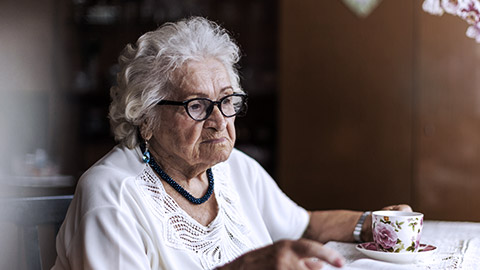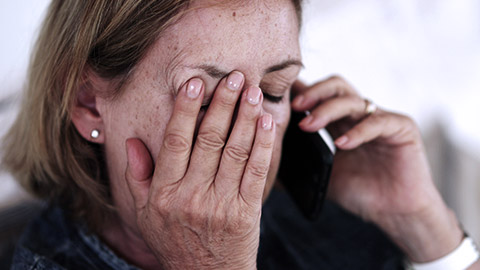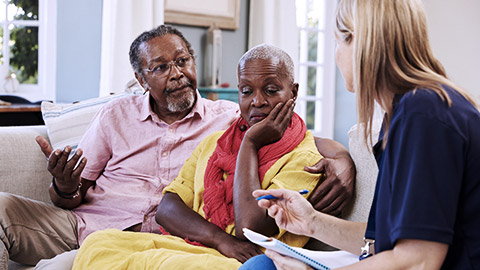It is important you respect the confidentiality, privacy rights and dignity of the carers, family and the people they support.
This includes demonstrating respect for the carer and family preferences, belongings and information.
Maintaining privacy and confidentiality is crucial to building trust between yourself and carers, family members and the person requiring care.
| Privacy | Confidentiality | Disclosure |
|---|---|---|
|
|
|
Carers have an ethical and legal duty to maintain the privacy and confidentiality of the person they are caring for.
As a support worker, you have an ethical and legal duty to maintain the privacy and confidentiality of the lifestyle, health and any personal information relating to the carer/s, family members and person who is being cared for.
The organisation you work for will have strict policies and procedures for the way in which you are expected to maintain a carer's and family’s privacy and confidentiality and work in an ethical manner. Confidentiality, privacy and disclosure relate to factors such as:
- The age of the person you are working with
- The type of information or task you are undertaking
- Your own role at the time.
Your organisation will provide you with support to know your legal obligations through various avenues for example:
- Orientation and training
- Staff meetings
- Debrief meetings
- Staff handbooks
- Supporting documentation is disseminated when changes are made to government policy and legislation relevant to your role.
The policies and procedures you are required to follow will ensure:
- The use of personal information complies with all privacy and confidentiality laws
- There are safeguards in place to secure personal information against loss or misuse
- The Australian Privacy Principles under the Privacy Act 1988 (Cmwth) are met
- Any obligations under the relevant state or territory privacy and confidentiality laws are met.
You must read and follow the organisation’s policies and procedures to know how to protect yourself legally.
Your coordinator will be able to guide you on how to apply organisational policy and procedures related to privacy and confidentiality in your daily work with carers, family members and people needing care.
Procedures will also provide practical guidelines on how to help carers or families of the people needing care as well as ways you can respond in a range of situations.
Activity – Discussion
Discuss with your trainer or colleagues strategies you could use to respect the confidentiality and privacy of the carer as well as the person with support needs.
Practical application
Some practical ways of upholding a person’s confidentiality and privacy may include:
- providing appropriate and safe choices
- acknowledging a person’s right to make decisions for themselves
- not making value judgments about what is right and wrong for other people
- professionally responding and communicating with the carer, family members and/or person needing care regardless of your opinions about their behaviour and values
- considering the situation from the person needing the care, the carer or family’s perspective
- keeping in mind that the carer, family members and person requiring care have the right to respect and dignity; this includes respecting their choices.
- using effective communication skills such as active listening, positive body language and showing empathy.
Confidentiality and privacy is also embedded in how a person’s daily activities and support are carried out (for example undressing in private) and how their care support arrangements, records and information are handled. Some examples are:
- Identifying and understanding who has access to carer, family member or person needing care’s personal information about their lifestyle or health and well-being.
- Knowing when and with whom the health status or care needs of the carer/s, family members or person requiring care can be shared with
- Not sharing or revealing carer or person requiring care personal information about health or other information unrelated to care if asked about by family members or friends where consent has not been granted
- Keeping systems, documents and records secure away from unauthorised persons. This might entail password protection on electronic devices and locked rooms or filing cabinets.
Consent to share information
Maintaining confidentiality is a part of respecting a person’s privacy and individual rights. In general, this means you need to have a person’s consent to be able to talk about their circumstances or needs with others, for example, referrals to other agencies or support services.
You must always check that the person providing the consent for the release of information is able to do so. There may be times when a person requiring care will have consent provided by others, such as when cognitively they are unable to make decisions. Usually, the person being able to do this has been given legal permission previously.
There may be exceptional circumstances that do allow you to disclose private information, such as an emergency or an unforeseen incident or accident. Confidentiality can only be overridden when following it means you could violate the law or harm could be caused to the person needing care, the carer/s or family members if you don’t. Any details regarding finance, sexual activity or relationships do not fall into this category.
You will need to know what these circumstances are for your work and how they will affect the way you work with carers, family members and the person requiring care.
Personal privacy
You need to think about how you carry out tasks, manage information and hold discussions and the implications for others who may have the potential or opportunity to listen or observe. For instance, a carer or family member may not want the person who is being cared for to hear discussions about their own emotional and physical well-being needs.
Some situations where you need to be mindful of privacy are:
- Led a meeting to discuss personal care tasks
- Making a phone call to a service provider about a person needing/receiving services
- Undertaking personal activities such as bathing, dressing, sexual intimacy
- In circumstances where the person’s dignity is at risk if observed or listened to by another person
- Where a family member or partner is at home when working directly with the person requiring care.
Remember to keep information private and confidential. Think about:
- What, when and where you talk about the person needing care and who can hear you
- What you write down, where it is left in the house and who might be able to read it
- Always logging in and out of your electronic device to keep information private
- What you hear from carers, family members or friends should not be repeated to others or in a public place.
Activity – Case study and discussion question

Family members are the carers for their elderly mother who cannot see or hear very well at all. She has thick glasses and hearing aids in both ears (which she turns off). She is getting to the stage where she needs full time care as her body functions have begun to fail.
The son and the daughter have different views on how their mother should be cared for. Both have medical power of attorney for their mother. The son wants to investigate end of life wishes as her mother has confided in him she does not want to be a burden in her old age and does not want to become a ‘vegetable’.
The daughter disagrees as she wants to have her mother around for some time and believes she can hear and interact with her even though the doctors indicate there is little cognitive movement in the brain.
The daughter and son have discussed their mothers wishes without her consent and have asked you as a support worker to make the decision as to how their mother should be cared for.
Questions
What are the ethical and legal concerns in this scenario?
How might you respond to the daughter and son, taking into consideration ethical and legal rights and responsibilities and the emotional state of the children?
Post your thought online or discuss with your trainer or colleagues.
Carers are a key component in caring for persons in need. Undertaking care activities can be very rewarding for the carer or family member.
However, for many carers, it can be a 24-hour-a-day job where they are required to deal with issues on a day-to-day basis. For others it may be dealing with issues over a period of time or as they arise.
Regardless of the time spent, the role the carer plays can be very stressful both in a physical manner.
The time committed to the care of persons strongly impacts the carer and family member’s ability to:
- keep themselves healthy physically, emotionally and mentally
- complete educational studies and follow a career
- participate in the workforce, maintain a full-time job and be financially stable
- participate effectively in social and community activities (ABS 2015).
Support services
Services you might observe are needed or that the carer, family or person being cared for may ask to have may include:
Often carers have less disposable income and may experience financial difficulties. Some carers may be in a position to be able to access Centrelink benefits to enable them to continue in their caring role. In other instances, a carer may need to reduce their hours of work or leave the workforce completely putting an additional financial burden on the carer and the family.
As such there will be times when the carer or family members may need support for themselves during the provision of care.
Many carers and family members may be unaware of the targeted support available to support and help them in their caring role.
It is part of your job to identify and respond to the specific needs of the carer or family members.
Carers and family members should be encouraged to realise they are not expected to do everything for the person requiring care and that they should seek and/or take help when it is offered or available.
Positive lifestyle outcomes for carers and family
You can assist and support carers to develop and maintain positive lifestyle outcomes that suit their personalities and what they prefer to do.
The support offered will depend on:
- The carer or family needs
- The needs of the person being cared for
- The availability of resources.
Available support cannot be forced onto carers. Your part is to provide information and suggest options relative to the circumstances care is given. For example, you might:
- where support is provided in the home of the person requiring care, suggest the carer use this time to do activities they cannot do when providing care such as a family outing with other family members, time out to sit quietly with a coffee and read a book/magazine.
- provide information about and/or help to arrange respite services either in the person’s home, a day program, or an overnight stay or a longer time in a residential care facility. Information about respite care can be found at www.health.gov.au and through My Aged Care and Carer Gateway
- leave brochures to read, provide contact person telephone numbers or discuss local community access or recreational programs that fit with the carer and family lifestyle or that enable the person with care needs to leave the home for periods of time.
- provide contact numbers in the form of cards or fridge magnets where a carer requests information about services to use if there is an emergency or crises, support is needed outside normal business hours or if they themselves become ill or experience anxiety.
- help to navigate financial support to help ease day-to-day living costs or to provide additional services for the person requiring care
- offer a range of available counselling support services, explaining these enable the carer to talk to someone else who can give them tools to work through or cope with mental or emotional issues as a result of caring for another person
- suggest some stress relieving techniques to help with day-to-day stress generated by the person needing care or the stresses of juggling daily living and working commitments
- arrange services for the carer, family members or person needing care where they are not able to do so themselves.
Carer health and wellbeing
Many carers and family members need reassurance they are doing ‘the right thing’ in doing things for themselves rather than for the person needing care.
Reassure carers that maintaining a positive lifestyle for themselves is not being selfish nor should they feel guilty for taking out some time for their own needs. Talk to them about how self-care will enable them to provide effective care for the person needing care. Discuss how if they are in a better physical and emotional state, they will be able to better remain positive to work well with the person needing care and potentially be able to continue providing care in the longer term.
Supporting the carer and family members
Every carer is different and their needs will change as the needs of the person they are caring for change or their life circumstances change.
Building trusting relationships is all about observing the carer and taking time to get to know them. Use effective communication skills to:
- Talk to them about how they are managing the care plan or working with the person they are caring for.
- Ask closed or open questions e.g. how has your day been? What have you done/are you going to do for your ‘me’ time this week? Discuss what their biggest challenge has been.
You might note that a pattern begins to emerge and this may be a time to talk to your coordinator about what can be done to change the plan or you might recognise the signs of the carer needing respite or a longer break.
- Be an active listener – really hear what they are saying by observing their body language, facial expressions, the way they are wearing their clothing or their tone of voice as well as the words
There may be times when you recognise the carer or family member is in desperate need of help but cannot identify this is the case, they are showing signs of poor physical or mental health, or they may be unwilling to provide care. In these situations, you may need to step in and discuss the issue with your coordinator or supervisor to ensure the safety of the carer and the person they are caring for.
Activity – Case study and discussion
Case study

A carer has revealed to you they love the person they are caring with dearly but are exhausted at always trying to be cheerful and positive, are feeling stressed as they cannot make bill payments or cook a decent meal; and on top of it are feeling guilty at not being able to always be on hand when the person they are caring for needs companionship or help with daily tasks.
Question
As a support worker, what would you do?
Post your response online or discuss it with your assessor or colleague.
As you will have already realised the demands of being a carer and/or a family member of the person needing care are wide reaching.
The impact of caring for an older person in need on carers and family members can be both rewarding or challenging.
Challenges
Key findings from the 2020 National Carer Survey indicated how carers and family members and their lives were impacted by caring for other persons:
- Nearly half of the carers who responded to the survey were experiencing high psychological distress
- One in three carers felt highly socially isolated
- One in four carers reported spending more money than they earned in the past 12 months
- Leaving employment or reducing working hours were common occurrences.
The respondents to the survey also indicated that their own needs were rarely asked about or considered when accessing services on behalf of the person they were caring for.
These issues can have an unhelpful and damaging effect on the physical, emotional and wellbeing of the carer and the family members’ own lives.
Activity – Research and question
Read the information from Carers Victoria about the impact of caring on carers and family and discuss the questions that follow with your trainer or colleagues.
Questions
What are four main areas that can challenge and impact on a carer?
For each of the main areas, select one fact about how it impacts on the carer and what you might be able to offer the carer or family member as support.
Post your thoughts online or discuss with your trainer or colleagues.
Emotional, mental and physical impact of caring on carers and family members.
Family, friends and carers can be impacted by the emotional, mental and physical wellbeing of the person being cared for. They may experience:
As a result, the carer and/or family members may face:
- Breakdown of relationships
- A feeling of disconnection from the community
- Spending less time with other family members who may/may not live in the same house
- Losing touch with friends
- Social exclusion and isolation due to a lack of understanding and stigma by others associated with the physical and mental condition (dementia, mental illness) of the person being cared for (Hill and Broady, 2019).
Research (Family Caregiver Alliance 2003) is also showing that there is some correlation between elderly carers experiencing stress related to caring for a spouse have a higher mortality rate than noncarers of the same age. It has also been found that hospitalisation of elderly spouses was associated with an increased risk of the death of the carer.
Discrimination
Despite the legislation and transparency around discrimination and discriminatory acts, there still may be times when other people will discriminate against another person.
Discrimination is when a person or group of people are treated less favourably or unfairly than another person or group because of their background or particular characteristics (Australian Human Rights Commission, 2023).
Carers and family members are often discriminated against purely by association with the person they are caring for. It can be as simple as a carer not being able to access a community activity because the person they are caring for has a walking aid and cannot climb a set of stairs. As a support worker when considering the type of service or support you might provide for the person requiring care, you must also consider the impact on the carer or family member.
You have a legal obligation to be aware of any action you might take that can be discriminatory towards the carer, family member or person who is needing care.
Activity – Case study and discussion question
Case Study

Paul, 50 years of age, is the younger brother of Daniel. Paul is Daniel’s full time carer.
Paul is beginning to feel extremely tired and his energy levels are low.
He is beginning to have resentful feelings towards Daniel as he is not able to find any time for himself. Paul has become isolated from friends who are tired of him cancelling outings with them.
He also wants to continue with his hobby of bird watching and writing a book about birds, a long life dream of his and one his friends used to encourage him to pursue.
Paul is thinking he may need additional support to care for Daniel, and is even contemplating a part time job to enable him to boost their financial situation.
Paul has shared his ideas with Daniel. However, Daniel has not received the ideas well and has become withdrawn. He shows no inclination to continue with the current activities he has previously been a part of both at home and in the community house.
Questions
- What might the psychological and physical risks be for Daniel?
- What risks might evolve for Paul if he does not change his way of living?
- What strategies might you suggest for Paul to help Daniel cope with the change?
- What are the physical and emotional impacts on Paul in these circumstances?
- What additional support might you suggest for Daniel so Paul can meet his needs?
Positive impact of caring on carers
We often focus on the negatives of carers and family members of people in their care. But, there are also many positive and rewarding aspects to caring. According to Carers Victoria, these include:
- Strengthening the relationship with the person being cared for and accepting how much they appreciate the help provided
- The opportunity for personal growth
- The opportunity to learn and develop new skills
- The satisfaction of knowing someone has been helped to improve their quality of life.
Activity – Watch a video
Watch the following video: Aged care quality standards: a message for personal carers to see how older people appreciate the help and support of carers.
Strategies to support the carer and the family members
As a support worker you will need to have a good understanding of the impact of caring for others and how it affects people in different ways, even within the same family circle.
This understanding will enable you to:
- provide appropriate and focussed support
- put in place processes early to build resilience in the carer and/or family member.
You can help the carer specifically by:
- Affirming and acknowledging the job and the way the carer does what they do
- Establishing trust in the carer/support worker relationship means the carer will have the confidence to share with you any concerns and feel able to input into any changes.
The carer may agree to the carer plan along with the person who is receiving care, but that does not mean they are always in a position to meet the care needs or want to continue the amount of care agreed to initially.
- Some carers may like to help you with the tasks you do. Thank them for their assistance and make them feel you have welcomed their help. Other carers will welcome the break and leave you to do your tasks
- Use your communication and observation skills to identify if the carer may need, benefit from or wish to undertake some training or education.
It may be you have noticed they are protecting their back, they mention how their legs ache at the end of the day or how they are frustrated at not being able to help with an electronic aid the person in care is using when it goes awry.
You don’t want to come across as an expert but you might find an opportunity to suggest they try some manual handling training, or training in assistive technologies.
- Carers do need breaks for themselves. You might in your role as support worker suggest a respite service or you might use assistive technologies such as monitors during sleep, so the carer can get a good night’s rest. Being refreshed from sleep can often be enough to have the carer feel upbeat and ready to face the caring activities.
- We often tend to forget the role male carers play in the lives of the people they care for. There is also a school of thought the male is stronger and therefore can cope with anything. However, male carers are often at risk of lower quality of life and being less satisfied with or able to manage their own health and well being as well as the person they are caring for. As a support worker, it is just as important to work out how to engage male carers as it is to engage female carers.
Monitoring the effectiveness of strategies
Once strategies are identified and put in place, it is also important to monitor their effectiveness. This ensures any issues can be identified early and addressed. It also plays an important part in making sure the carer, the family members and the person needing care has positive outcomes.
Reporting any concerns
If you observe anything that concerns you about the care plan, the carer, family member or person needing care’s emotional, physical or mental state you must follow workplace procedure and report to your coordinator.
This is part of your duty of care to both the person needing care, the carer and the family members.

Keep your own knowledge about available services and trends up to date to be able to effectively inform carers or family members of the appropriate services available to them in their local area and more broadly as needed.
You can keep in touch through organisations such as:
- Carers Australia
- your state or territory departments covering health and aged care
- carer organisations such as Beyond Blue or Lifeline
You should provide carers and family members with information about services that will:
- assist and support them in the care they provide and
- to maintain their own standard of health and well-being.
Support for both carers and the person being cared for is available through commonwealth and state government departments and other organisations such as:
| Carer Gateway | An Australian Government program providing free practical and emotional services and support for carers. Carers are encouragedto access support through the phone line or through their website. |
|---|---|
| My Aged Care | Australian Government funded aged care service providing information, links and support to help carers and family members to navigate the aged care system and access care services. |
| Carers Australia | A national peak body representing unpaid carers in Australia. Carers Australia collects statistics on carer needs and role. It advocate on behalf of carers to influence services and policy at a national level. Each state and territory has their own website. |
| Carers Victoria | Advice and information to support Victorian carers to improve their welbeing, health, capacity and resilience. Links are provided for financial benefits available to carers. |
| Department of Health and Aged Care (Cwth) | Programs and services to support older people to maintain their independence and health such as Commonwealth Support Program (CHSP) and the Home Care Packages. |
| Department of Health (Vic) | Support to Victorians in care relationships through respite services, carer card program, public transport services and Support for Carers Program |
Activity – Research
Consider your local area. What support organisations are available to support carers for older people?
Research one service on the internet. Have a look at the About Us page to find out what they do, the organisation structure and whether it is private or government.
Explore the website to for an overview of the services offered and the type of funding available to carers.
Post your organisation findings online or discuss with your trainer or colleagues.
Remind carers:
- they need to look after themselves if they are going to care and support others
- support services are not just for the person requiring care. There are also support groups available through the Carer Gateway either nationally or within their own state or territory.
Carers should be encouraged to join these groups, even if it is just reading information or newsletters online.
Being in touch with other carers or hearing how they deal with different issues is supportive and the carer may feel they are not isolated in their concerns, grief, anger or helplessness at not being able to help the person they care for.
Support for the support worker
Support worker team and peer groups and support can be very helpful to you as a support worker. Attend meetings and make use of your coordinator or supervisor to talk things over.
Other care workers often see things differently as they are removed from your situation. They often have experience and knowledge to share and may be able to help clarify problems other staff members may be having. Ideas and ways to solve a problem can then in turn be taken back to the carer and person being cared for to discuss or suggest.
Remember when discussing carers or persons who are in care to keep personal information confidential and private. You might use a pseudonym, a nickname or a first name in discussions that only you know about.
Activity – Access and read information
There may be times when a carer or family member wants to share their experiences through surveys or discussions.
Read the privacy and confidentiality policy of Carers Victoria.
It covers their commitment to respecting a carer’s right to privacy and confidentiality and protecting their personal information when using their website, participating in surveys via electronic media or joining in training programs or discussions.
The policy will also give you an understanding of how personal information is protected.

